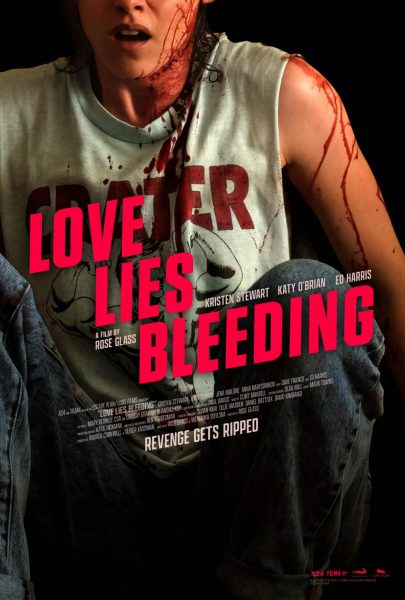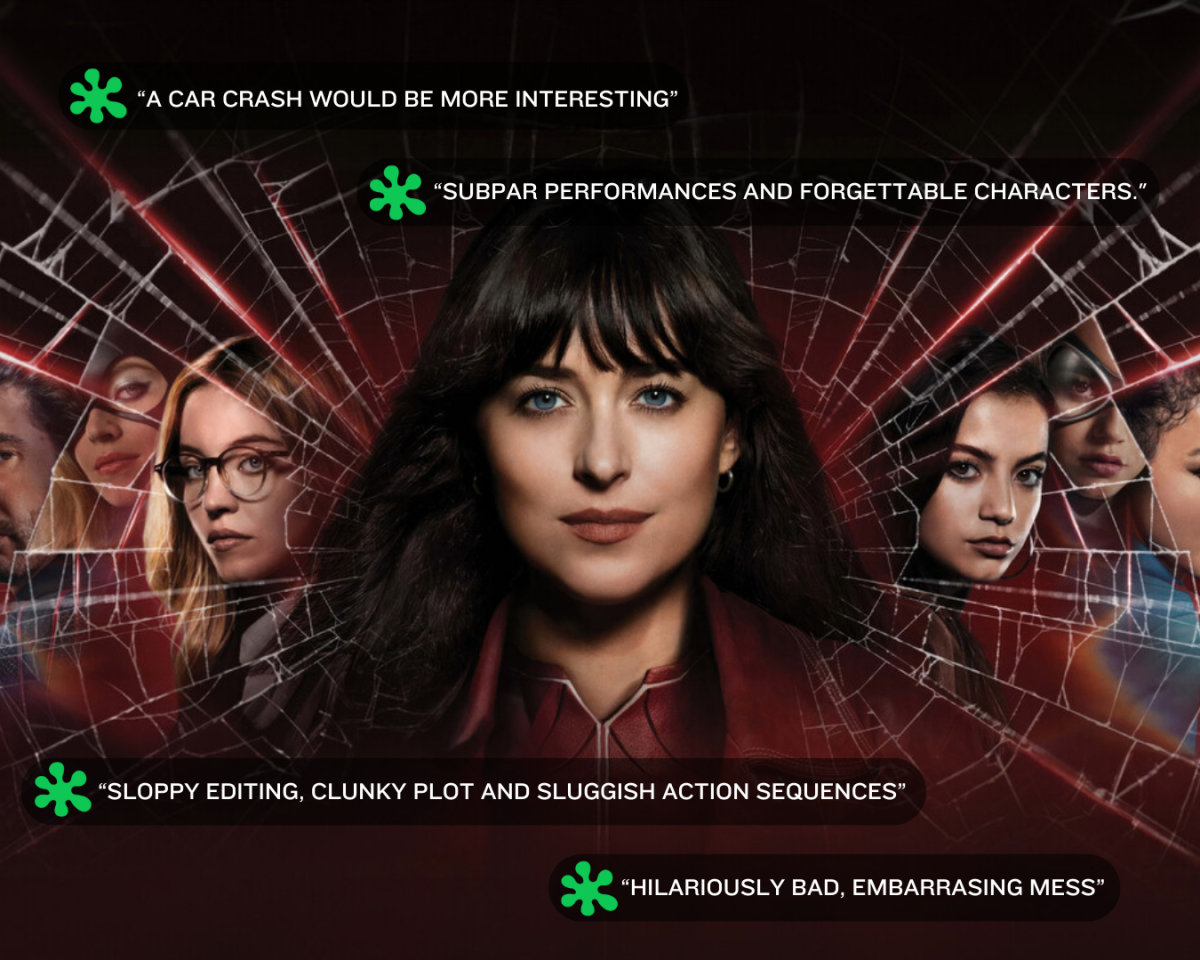
This review contains spoilers.
How do you describe a movie like “Love Lies Bleeding?” Is it neo-noir? Body horror? Western? Thriller? Surrealist? All of the above? Whatever it is, there’s something about its unapologetically unhinged nature that I deeply admire.
Following Kristen Stewart’s Lou, a brooding gym manager who has a strained relationship with her father, the film revolves around her love-at-first-sight romance with Jackie, played by Katy O’Brian. However, conflicts arise when Lou discovers that Jackie, who is passing through town to attend a bodybuilding competition in Las Vegas, works at a shooting range owned by Lou’s father, Lou Sr., played by Ed Harris. Familial secrets begin to unravel as writer-director Rose Glass transforms a seemingly ordinary, lustful romance into a twisting-and-turning, crime-thrilling roller coaster of an experience.
For a movie that defies classification into a single genre, it should be to no one’s surprise to know that Glass pridefully wears many of her influences, refusing to hide references to the artists that inspired her the most. I was particularly reminded of David Lynch’s surreal “Lost Highway” (1997) and neo-noir “Blue Velvet” (1986), evidenced in the scenes of cars accelerating along pitch-black highways and the narrative backdrop of a small town hiding a dark, crime-riddled underbelly.
David Cronenberg is another director that comes to mind, especially in how Glass, in the vein of “Crash” (1996) or “Crimes of the Future” (2022), contorts and distorts images of the human body — particularly in the context of performance-enhanced bodybuilding — to create something disgusting and viscerally unnerving.
The film also draws inspiration from the narratively-kinetic thrillers of the Coen Brothers, specifically regarding the unhinged brutality of the movie’s pulpiness. In a way, you can almost say this is the lesbian Coen Brothers movie we should have gotten, as Ethan Coen’s critically dismissed “Drive-Away Dolls,” which follows two friends-turned-lovers on their trip to Tallahassee, perhaps leans too heavily into the brothers’ comedic sensibilities.
All this could sound like a shameless, uninspired pastiche, and it does come dangerously close to crossing that line. But Glass’ direction is so intrepid through the voyeurism of her camera, and the performances from everyone are too stellar not to give the film some benefit of the doubt.
Stewart is especially revelatory, hitting all the right emotional beats in her performance, while Clint Mansell’s throbbing score amplifies Stewart’s presence — creating this one-two-punch of anxiety-inducing tension. Over the past decade, Stewart and her former “The Twilight Saga” co-star Robert Pattinson have been keenly shedding their heartthrob personas, taking on unorthodox roles in unconventional movies. While Pattinson has achieved more notoriety for his roles, Stewart has quietly established herself as one of the most audacious actors working — even working with Cronenberg in “Crimes of the Future” — and seeing her subtly keep this conceptually all-over-the-place movie in check is one of her finest examples.
Amidst Harris’ bug-eating fiasco and O’Brian’s convincing emotional volatility comes Daisy, played by Anna Baryshnikov, whose infatuation with Lou triangulates an already-complicated dynamic between Jackie and Lou. Throughout the film, Daisy is noticeably suspicious of the two individuals, connecting the dots of their romance while blackmailing Lou for her and Jackie’s connection to murder. Though limited in screen time, Baryshnikov effortlessly demands the spotlight in every scene she’s in, whether they’re comedic or sinister. If there’s any justice in this world, Baryshnikov will be in high demand for the foreseeable future.
By this point, “Love Lies Bleeding” seemed destined for greatness, as if nothing would stop it from being one of the best thrillers of the decade. But in its final act, the movie’s momentum noticeably falters.
Glass structures the film to become progressively weirder and more surreal as the town’s secrets unravel. That surrealism is captured in little moments throughout the film, portraying the psychological chaos within these characters. However, two moments stand out the most. In one scene, Jackie hallucinates that she’s vomiting a fully-grown Lou during the bodybuilding competition; in another scene, the lingering effects of Jackie’s steroid addiction manifest as her body bulks in increasingly unnatural, grotesque ways.
Eventually, however, the film’s surrealism becomes too weightless in its excess, making it difficult to suspend one’s disbelief, and that just so happens to occur at the very end. The closing sequence, where Jackie conveniently grows and almost resembles a female Hulk to save Lou, will almost certainly make or break many people’s final opinions on “Love Lies Bleeding.” I found it too absurd to embrace, but despite this flaw, the film’s constant ambition shines so dazzlingly that I couldn’t help but feel satisfied with the end product.














